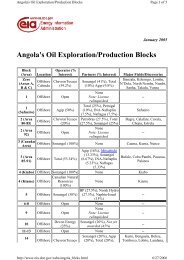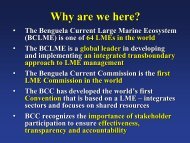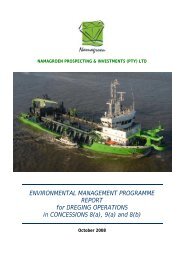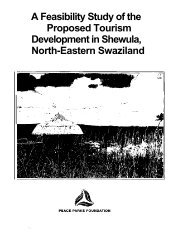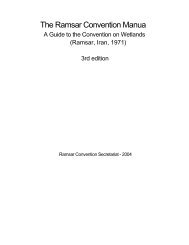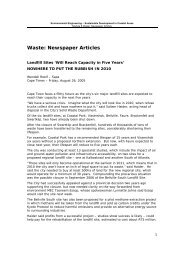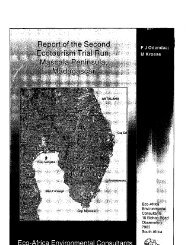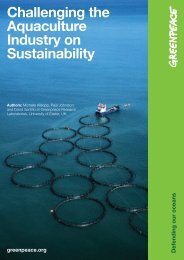Full report LR.pdf - DLIST Benguela
Full report LR.pdf - DLIST Benguela
Full report LR.pdf - DLIST Benguela
- No tags were found...
You also want an ePaper? Increase the reach of your titles
YUMPU automatically turns print PDFs into web optimized ePapers that Google loves.
NACOMA Project – Preparation PhaseAnalysis of the Institutional Capacity in the Namib Coast Regional Councils• Administrative level, e.g. CRO’s, whom would find more detailed training useful –including basic environmental planning/ management training and project managementto build technical competency. Deputy Directors and senior staff in line ministriescould be accommodated at this level.• Operational level, e.g. Economic/ Development/ Environmental Planners.Comprehensive/ detailed training will be required – including project management,ICZM and BCP. This level is applicable for all relevant Supervisors and operationalstaff in line ministries.• Study visits/ tours to South Africa and possibly also Tanzania should be undertaken ona “lessons learned” basis as those countries can help Namibia avoid certain pitfalls.• Introduce role players to plans other than the RDP as well as the later has its limitationsin terms of what it can do for ICD and BCP. Eventually all good plans can find a placein the spatial planning for the coastal areas.• Basic environmental training courses should be provided to all the relevant staff at thecoastal Regional Councils as well as line ministries - regularly.Pertaining to the interval of capacity-building initiatives/ programmes:• Short training courses (about a week duration) – this could be in-house or away fromwork (although the former is preferred). Workshops and seminars are suitable optionsfor this type of training.• Longer-term training courses, which include studies at recommended tertiaryinstitutions.• Due to their appropriate skills and competencies, the MET staff and the‘Environmental Planner’ could provide certain short-courses to staff within lineministries and Regional Councils. However, they would requiring some trainingthemselves – if not in terms of aspects of the environment then at least in terms ofgovernance and physical planning - which could be provided by external institutions/consultants.Targets: A well-structured training programme, which forms part of an overall regionaldevelopment management plan, can be developed at the start of the projectimplementation period. Strengthening existing synergies among relevant stakeholdersand institutions will consolidate this intervention.Activity 3.3. Recruiting and training “Environmental Planner” in the Regional Councils• Incumbent should possess strong training skills to create overall awareness and exposepeople (via practical training) to fundamental issues and practices based on ICZM,BCP and ICD.• Training (transfer of skills and knowledge) should be hands-on and in-house-orientedto optimise institutional resources and for better outcomes.• Collection of relevant information (via research) and establishment of a database(mainly environmental issues) need to form an integral part of the incumbent’s jobdescription.• The incumbent should be responsible for the interactive linkage/ networking betweenthe line ministries (particularly the MET) and the Regional Councils as well as withrelevant research, academic, private and public institutions, NGO’s, etc and37



